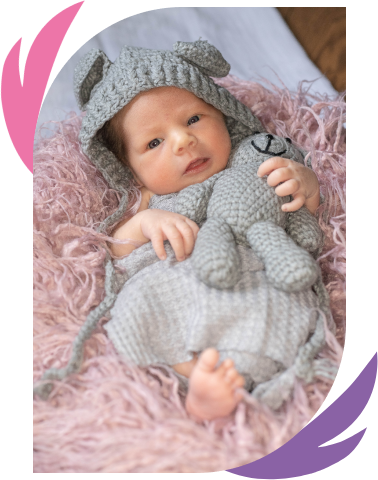
Egg donation is a wonderful way a woman can help someone who has the dream to have a child. In most cases, women donate eggs to help a family member or friend who is struggling with infertility. Isn’t that amazing?
Interested in being an Egg Donor? We’ll explain all the rules. If you want to know more about Lucina’s Egg Donation program, please reach out. We will be happy to help!
Egg Donation Requirements: What Are They?
Are there any Egg Donor requirements? Of course!
As for any medical procedure, it’s important to follow certain guidelines which in this case are set by the American Society of Reproductive Medicine.
Why are those Egg Donor qualifications in place?
We need to make sure you are safe during the procedure, but we also need to make sure the eggs are viable and healthy. Remember that many Intended Parents have been experiencing difficulties in their fertility journey, so they have set all their hopes in egg donation.
Who can be a donor? To become an Egg Donor you need to meet the following criteria:
- Be between 19 and 31 years old
- Having a healthy lifestyle
- Non-smoker
- Having a BMI less than 28
- Education is a plus
These are the basic requirements, but if you want to know other requirements and why they are in place, keep reading!
Egg Donor Age Requirement
As you may imagine, the age requirement in egg donation is essential for both legality and optimal outcomes. The minimum age requirement is established to ensure applicants are eligible to enter into a legal contract. While a woman is considered an adult at 18, some states require that a prospective donor be 19 years old to enter into an egg donation agreement. Additionally, professionals in this healthcare space have determined that an egg donation journey requires a degree of maturity and responsibility, allowing the donor to take on the commitment of becoming an donor.
The maximum age for Egg Donors in our program is 31. The reason for this is egg quality and which directly impacts the outcome of an egg donation cycle. For women, peak fertility is between the ages of 19 and 29. This age is the time of optimal egg quality and therefore is the ideal target for donor eggs.
Healthy lifestyle
A healthy lifestyle dramatically influences the quality of donors’ eggs. Every woman has her own lifestyle that she is comfortable with. A healthy lifestyle implies several things, but the most important is that you take care of yourself, exercise, eat well and keep a healthy state of mind.
You don’t need to be a highly skilled sportswoman, but it is important you exercise regularly. Eating a balanced diet and staying hydrated is key to feeling good. Finally, keeping a healthy state of mind is important too as egg donation may be emotionally challenging.
Non-smoker
Did you know nicotine and tobacco significantly impact fertility? These components impact the quality of Egg Donor requirements and the outcome of an egg donation cycle. Infertility rates in female smokers are about twice the rate of infertility found in non-smokers.
Furthermore, the risk for fertility problems increases with the quantity smoked, and even fertility treatments may not be able to overcome the effects smoking has on fertility. Female smokers require more fertility stimulating medication during the cycle, they have fewer eggs at retrieval, and the eggs they produce have 30% lower pregnancy rates than people who do not smoke.
BMI requirements for Egg Donation: less than 28
BMI is a formula calculated from your height and your weight. Scientific studies show that people with a BMI under 18 or over 26 are at a higher risk for medical complications
Additionally, other studies show a link between issues with eggs and how they develop in those with higher BMI. Adipose tissue, otherwise known as fat tissue, is hormonally active and could negatively affect eggs and the hormones that help them develop. Ghrelin, a hormone produced by fat tissue, affects estradiol and progesterone, which play a critical role in egg development.
Those with a BMI below 18 are at an increased risk of potential side effects from the medications used during the stimulation cycle. This condition, OHSS (Ovarian Hyperstimulation Syndrome), causes the ovaries to become swollen and the belly to accumulate fluid. It can be dangerous and avoided as the safety of the donor is the highest priority.
We realize that BMI does not account for muscle mass, and therefore we accept donors with a BMI between 18 and 28. We recognize that many applicants with BMI greater than our maximum requirement are healthy; however, due to the volume of applicants, we cannot proceed with an Egg Donor until their BMI is within this range.
Education
You may wonder why education is important if you want to donate your eggs. Most intended parents are looking for a donor who resembles their physical features and has a similar background and education. Many intended parents place a high value on education as most have a college degree. Often they pursue donors with similar areas of interest and fields of study. Egg Donors, at a minimum, should have a high school diploma, and the greater your educational accomplishments are, increases your likelihood of being selected as an donor.
Medications
Medications can impact fertility and the outcomes of egg donation cycles. We must establish that a donor can safely discontinue these medications during the egg donation cycle to prevent these medication’s from interfering with the outcome of the cycle.
Some medicines are not safe for a donor to discontinue, while other drugs can be taken on an as-needed basis. If you are under any such medication and want to be an donor, we suggest completing the application. The clinical team will then review your application case-by-case to determine if you can take the medications you are prescribed during an egg donation cycle. If so, or if you can safely discontinue them during the cycle, you will be able to proceed to your donation cycle.
Medical history and family medical history
Personal and family medical history is critical to understanding genetic predispositions you may have. Egg Donor requirements also include to pass medical, genetic, and psychological conditions to future generations. This is the reason why you must be able to obtain information about both sides of your family, as a donor can pass these conditions to the donor-conceived child.
We aim to do everything we can to give the recipient of your egg donation the best chances of having a healthy child.
Background check
As you can probably imagine, Intended Parents entrust an Egg Donor with their most precious dream, and that is why the parent requires to know that the egg donation process will be safe and free of disruption.
This is the reason it is a requirement for a prospective Egg Donor requirements to undergo and pass a background screening. The screening will disclose any past criminal activity and ensure the candidate doesn’t have any pending legal issues. It is essential that Intended Parents are confident that the donor isn’t facing the possibility of legal restrictions that would interfere with the donation journey.
We hope you have found this information useful. Remember, all the requirements are established by the American Society of Reproductive Medicine and are in place because your safety is our top priority.
If you have further questions, you can always contact us and we will be happy to help.












